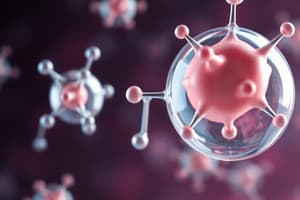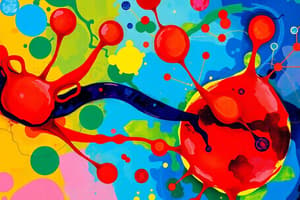Podcast
Questions and Answers
Which statement accurately describes the characteristics of steroid hormones?
Which statement accurately describes the characteristics of steroid hormones?
- They primarily act by binding to receptors on cell membranes.
- They are secreted solely by the pituitary gland.
- They are derived from cholesterol or its derivatives. (correct)
- They are synthesized from amino acids directly.
What is a key feature of hormone receptors?
What is a key feature of hormone receptors?
- Each receptor is specific to one single hormone. (correct)
- Receptors are located exclusively in the nucleus of target cells.
- Receptors are only present in the adrenal cortex.
- Each receptor can bind to multiple different hormones.
How do hormones primarily exert their effects on target cells?
How do hormones primarily exert their effects on target cells?
- By directly entering the target cell cytoplasm.
- By promoting cellular apoptosis immediately.
- By altering the permeability of the cell membrane. (correct)
- By forming a complex that alters receptor shape.
Which hormones are classified as protein hormones?
Which hormones are classified as protein hormones?
Where can hormone receptors be found in target cells?
Where can hormone receptors be found in target cells?
Which type of hormone has receptors primarily located in the nucleus of target cells?
Which type of hormone has receptors primarily located in the nucleus of target cells?
What is the primary source of secretion for testosterone?
What is the primary source of secretion for testosterone?
What occurs during down regulation of hormone receptors?
What occurs during down regulation of hormone receptors?
What is the main consequence of up regulation in hormone receptors?
What is the main consequence of up regulation in hormone receptors?
Which hormone is produced by the anterior pituitary gland?
Which hormone is produced by the anterior pituitary gland?
What term describes the process through which hormone-receptor complexes enter target cells?
What term describes the process through which hormone-receptor complexes enter target cells?
Which of the following hormones is classified as a steroid hormone?
Which of the following hormones is classified as a steroid hormone?
Where are the receptors for adrenal medullary hormones generally located?
Where are the receptors for adrenal medullary hormones generally located?
What initiates the activation of protein kinase C (PKC) in the hormone signaling pathway?
What initiates the activation of protein kinase C (PKC) in the hormone signaling pathway?
Which hormone is primarily responsible for the transcription activation within the nucleus after binding to its receptor?
Which hormone is primarily responsible for the transcription activation within the nucleus after binding to its receptor?
What is the role of inositol triphosphate (IP3) in the signaling mechanism?
What is the role of inositol triphosphate (IP3) in the signaling mechanism?
Which division of the pituitary gland is responsible for producing hormones rather than storing them?
Which division of the pituitary gland is responsible for producing hormones rather than storing them?
What is the effect of protein kinases following their activation in the hormone signaling pathway?
What is the effect of protein kinases following their activation in the hormone signaling pathway?
Which response is NOT produced by cyclic AMP?
Which response is NOT produced by cyclic AMP?
Which of the following hormones is released by the posterior pituitary?
Which of the following hormones is released by the posterior pituitary?
What role does calmodulin play in hormone action?
What role does calmodulin play in hormone action?
In the context of steroid hormone action, what occurs after mRNA is produced?
In the context of steroid hormone action, what occurs after mRNA is produced?
Which statement regarding inositol triphosphate (IP3) is correct?
Which statement regarding inositol triphosphate (IP3) is correct?
What type of reaction does phospholipase C catalyze in the hormone signaling pathway?
What type of reaction does phospholipase C catalyze in the hormone signaling pathway?
Which of the following substances acts like cyclic AMP in signaling pathways?
Which of the following substances acts like cyclic AMP in signaling pathways?
What initiates the production of inositol triphosphate (IP3) and diacylglycerol?
What initiates the production of inositol triphosphate (IP3) and diacylglycerol?
How do thyroid hormones execute their function within target cells?
How do thyroid hormones execute their function within target cells?
What is the role of diacylglycerol in hormone signaling?
What is the role of diacylglycerol in hormone signaling?
Which of the following best describes the relationship between adenyl cyclase and cAMP?
Which of the following best describes the relationship between adenyl cyclase and cAMP?
What is the role of the hormone-receptor complex in hormonal action?
What is the role of the hormone-receptor complex in hormonal action?
Which of the following statements about second messengers is true?
Which of the following statements about second messengers is true?
Which physiological action is primarily mediated by cyclic AMP?
Which physiological action is primarily mediated by cyclic AMP?
What triggers the dissociation of the α-GTP unit and β-γ dimer from the receptor?
What triggers the dissociation of the α-GTP unit and β-γ dimer from the receptor?
Which G protein subunit primarily exerts biological effects upon activation?
Which G protein subunit primarily exerts biological effects upon activation?
What initiates the activation of adenyl cyclase in the second messenger cascade?
What initiates the activation of adenyl cyclase in the second messenger cascade?
What occurs when acetylcholine binds to its receptors at the neuromuscular junction?
What occurs when acetylcholine binds to its receptors at the neuromuscular junction?
What is a common second messenger involved in protein hormone signaling?
What is a common second messenger involved in protein hormone signaling?
Which statement best describes the function of G proteins in hormonal signaling?
Which statement best describes the function of G proteins in hormonal signaling?
Flashcards are hidden until you start studying
Study Notes
Chemistry of Hormones
- Hormones are classified into steroid hormones, protein hormones, and tyrosine-derived hormones, based on their chemical nature.
- Steroid hormones are synthesized from cholesterol and secreted by adrenal cortex, gonads, and placenta.
- Protein hormones consist of large or small peptides produced by the pituitary gland, parathyroid glands, pancreas, and placenta.
- Tyrosine-derived hormones include thyroid hormones (like thyroxine) and adrenal medullary hormones (such as adrenaline and noradrenaline).
Hormonal Action
- Hormones interact with specific receptors on target cells to form a hormone-receptor complex, resulting in cellular changes.
- Each cell has thousands of specific receptors, with each receptor designed for only one type of hormone.
Location of Hormone Receptors
- Receptors for protein hormones and catecholamines are found in the cell membrane.
- Steroid hormone receptors are located in the cytoplasm.
- Thyroid hormone receptors reside in the cell nucleus.
Regulation of Hormone Receptors
- Down regulation occurs when there is an excess of a hormone, leading to decreased receptor numbers.
- Up regulation increases the number of receptors when there is a deficiency of the hormone.
- Hormone-receptor complexes may be internalized in the cell, where they can be recycled or degraded.
Mechanism of Hormonal Action
- Hormonal actions are mediated through processes like altering cell membrane permeability, activating intracellular enzymes, or acting directly on genes.
- Hormones serve as first messengers; the second messengers, such as cyclic AMP (cAMP), facilitate the hormonal effects within target cells.
Action of Cyclic AMP
- cAMP acts as a second messenger that mediates the effects of protein hormones and catecholamines by activating protein kinase A.
- Key responses initiated by cAMP include muscle contraction and relaxation, altering cell membrane permeability, substance synthesis, and secretion.
Other Second Messengers
- Calcium ions and calmodulin can also act as second messengers, facilitating various cellular responses, especially in muscle contraction.
- Inositol triphosphate (IP3) and diacylglycerol (DAG) are formed from phosphatidylinositol bisphosphate (PIP2) and contribute to signaling cascades.
- Cyclic guanosine monophosphate (cGMP) resembles cAMP and acts through protein kinase A.
Mode of Action of Steroid Hormones
- Steroid hormones pass through cell membranes to bind with receptors in the nucleus, activating gene transcription.
- This interaction leads to mRNA production, directing protein synthesis and eliciting physiological responses.
Pituitary Gland
- The pituitary gland, located in the sphenoid bone, has anterior (adenohypophysis) and posterior (neurohypophysis) divisions.
- Anterior Pituitary hormones include growth hormone, prolactin, thyroid-stimulating hormone, adrenocorticotropic hormone, follicle-stimulating hormone, and luteinizing hormone.
- The Posterior Pituitary stores and releases antidiuretic hormone (ADH) and oxytocin, produced by the hypothalamus.
Studying That Suits You
Use AI to generate personalized quizzes and flashcards to suit your learning preferences.




